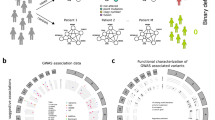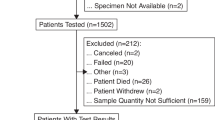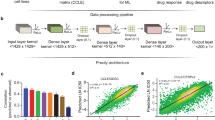Abstract
Cancer treatment is complicated because of a multitude of treatment options and little patient-specific information to help clinicians choose appropriate therapy. There are two genomes relevant in cancer treatment: the tumor (somatic) and the patient (germline). Together, these two genomes dictate treatment outcome through four processes: the somatic genome primarily determines tumor prognosis and response while the germline genome modulates treatment exposure and toxicity. In this review, we describe the influence of these genomes on treatment outcomes by highlighting examples of genetic variation that are predictors of each of these four factors, prognosis, response, toxicity and exposure, and discuss the translation and clinical implementation of each. Use of pre-treatment pharmacogenetic testing will someday enable clinicians to make individualized therapy decisions about aggressiveness, drug selection and dose, improving treatment outcomes for cancer patients.
Similar content being viewed by others
Log in or create a free account to read this content
Gain free access to this article, as well as selected content from this journal and more on nature.com
or
References
McLeod, H. L. Cancer pharmacogenomics: early promise, but concerted effort needed. Science 339, 1563–1566 (2013).
Gerlinger, M., Rowan, A. J., Horswell, S., Larkin, J., Endesfelder, D., Gronroos, E. et al. Intratumor Heterogeneity and branched evolution revealed by multiregion sequencing. N. Engl. J. Med. 366, 883–892 (2013).
Ganem, N. J. & Pellman, D. Linking abnormal mitosis to the acquisition of DNA damage. J. Cell Biol. 199, 871–881 (2012).
Greene, F. L. & Sobin, L. H. The staging of cancer: a retrospective and prospective appraisal. CA Cancer J. Clin. 58, 180–190 (2008).
Sørlie, T., Perou, C. M., Tibshirani, R., Aas, T., Geisler, S., Johnsen, H. et al. Gene expression patterns of breast carcinomas distinguish tumor subclasses with clinical implications. Proc. Natl Acad. Sci. USA 98, 10869–10874 (2001).
Nielsen, T. O., Parker, J. S., Leung, S., Voduc, D., Ebbert, M., Vickery, T. et al. A comparison of PAM50 intrinsic subtyping with immunohistochemistry and clinical prognostic factors in tamoxifen-treated estrogen receptor-positive breast cancer. Clin. Cancer Res. 16, 5222–5232 (2010).
Goldhirsch, A., Ingle, J. N., Gelber, R. D., Coates, A. S., Thürlimann, B., Senn, H. et al. Thresholds for therapies: highlights of the St Gallen International Expert Consensus on the primary therapy of early breast cancer 2009. Ann. Oncol. 20, 1319–1329 (2009).
Paik, S., Shak, S., Tang, G., Kim, C., Baker, J., Cronin, M. et al. A multigene assay to predict recurrence of tamoxifen-treated, node-negative breast cancer. N. Engl. J. Med. 351, 2817–2826 (2004).
Albain, K. S., Barlow, W. E., Shak, S., Hortobagyi, G. N., Livingston, R. B., Yeh, I. T. et al. Prognostic and predictive value of the 21-gene recurrence score assay in postmenopausal women with node-positive, oestrogen-receptor-positive breast cancer on chemotherapy: a retrospective analysis of a randomised trial. Lancet Oncol. 11, 55–65 (2010).
Sparano, J. A. The TAILORx trial: individualized options for treatment. Comm. Oncol. 83, 494–496 (2006).
van’t Veer, L. J., Dai, H., van de Vijver, M. J., He, Y. D., Hart, A. A., Mao, M. et al. Gene expression profiling predicts clinical outcome of breast cancer. Nature 415, 530–536 (2002).
van de Vijver, M. J., He, Y. D., van’t Veer, L. J., Dai, H., Hart, A. A., Voskuil, D. W. et al. A gene-expression signature as a predictor of survival in breast cancer. N. Engl. J. Med. 347, 1999–2009 (2002).
Wittner, B. S., Sgroi, D. C., Ryan, P. D., Bruinsma, T. J., Glas, A. M., Male, A. et al. Analysis of the MammaPrint breast cancer assay in a predominantly postmenopausal cohort. Clin. Cancer Res. 14, 2988–2993 (2008).
Rutgers, E., Piccart-Gebhart, M. J., Bogaerts, J., Delaloge, S., Veer, L. V., Rubio, I. T. et al. The EORTC 10041/BIG 03-04 MINDACT trial is feasible: results of the pilot phase. Eur. J. Cancer 47, 2742–2749 (2011).
Fan, C., Oh, D. S., Wessels, L., Weigelt, B., Nuyten, D. S., Nobel, A. B. et al. Concordance among gene-expression-based predictors for breast cancer. N. Engl. J. Med. 355, 560–569 (2006).
Tsimberidou, A. M., Iskander, N. G., Hong, D. S., Wheler, J. J., Falchook, G. S., Fu, S. et al. Personalized medicine in a phase I clinical trials program: the MD Anderson Cancer Center initiative. Clin. Cancer Res. 18, 6373–6383 (2012).
Roychowdhury, S., Iyer, M. K., Robinson, D. R., Lonigro, R. J., Wu, Y. M., Cao, X. et al. Personalized oncology through integrative high-throughput sequencing: a pilot study. Sci. Transl. Med. 3, 111ra121 (2011).
Mandrekar, S. J. & Sargent, D. J. Clinical trial designs for predictive biomarker validation: theoretical considerations and practical challenges. J. Clin. Oncol. 27, 4027–4034 (2009).
Inoki, K., Corradetti, M. N. & Guan, K. L. Dysregulation of the TSC-mTOR pathway in human disease. Nat. Genet. 37, 19–24 (2005).
Meikle, L., Pollizzi, K., Egnor, A., Kramvis, I., Lane, H., Sahin, M. et al. Response of a neuronal model of tuberous sclerosis to mammalian target of rapamycin (mTOR) inhibitors: effects on mTORC1 and Akt signaling lead to improved survival and function. J. Neurosci. 28, 5422–5432 (2008).
Franz, D. N. Everolimus: an mTOR inhibitor for the treatment of tuberous sclerosis. Expert Rev. Anticancer Ther. 11, 1181–1192 (2011).
Iyer, G., Hanrahan, A. J., Milowsky, M. I., Al-Ahmadie, H., Scott, S. N., Janakiraman, M. et al. Genome sequencing identifies a basis for everolimus sensitivity. Science 338, 221 (2012).
Davies, H., Bignell, G. R., Cox, C., Stephens, P., Edkins, S., Clegg, S. et al. Mutations of the BRAF gene in human cancer. Nature 417, 949–954 (2002).
Tsai, J., Lee, J. T., Wang, W., Zhang, J., Cho, H., Mamo, S. et al. Discovery of a selective inhibitor of oncogenic B-Raf kinase with potent antimelanoma activity. Proc. Natl Acad. Sci. USA 105, 3041–3046 (2008).
Flaherty, K. T., Puzanov, I., Kim, K. B., Ribas, A., McArthur, G. A., Sosman, J. A. et al. Inhibition of mutated, activated BRAF in metastatic melanoma. N. Engl. J. Med. 363, 809–819 (2010).
Chapman, P. B., Hauschild, A., Robert, C., Haanen, J. B., Ascierto, P., Larkin, J. et al. Improved survival with vemurafenib in melanoma with BRAF V600E mutation. N. Engl. J. Med. 364, 2507–2516 (2011).
Halait, H., Demartin, K., Shah, S., Soviero, S., Langland, R., Cheng, S. et al. Analytical performance of a real-time PCR-based assay for V600 mutations in the BRAF gene, used as the companion diagnostic test for the novel BRAF inhibitor vemurafenib in metastatic melanoma. Diagn Mol. Pathol. 21, 1–8 (2012).
Li, F. P. Translational research on hereditary colon, breast, and ovarian cancers. J. Natl Cancer Inst. Monogr. 17, 1–4 (1995).
McLeod, H. L. & Evans, W. E. Pharmacogenomics: unlocking the human genome for better drug therapy. Annu. Rev. Pharmacol. Toxicol. 41, 101–121 (2001).
Theodoratou, E., Montazeri, Z., Hawken, S., Allum, G. C., Gong, J., Tait, V. et al. Systematic meta-analyses and field synopsis of genetic association studies in colorectal cancer. J. Natl Cancer Inst. 104, 1433–1457 (2012).
Siddiq, A., Couch, F. J., Chen, G. K., Lindstrom, S., Eccles, D., Millikan, R. C. et al. A meta-analysis of genome-wide association studies of breast cancer identifies two novel susceptibility loci at 6q14 and 20q11. Hum. Mol. Genet. 21, 5373–5384 (2012).
Collins, F. S. & Barker, A. D. Mapping the cancer genome. Pinpointing the genes involved in cancer will help chart a new course across the complex landscape of human malignancies. Sci. Am. 296, 50–57 (2007).
Cancer Genome Atlas Network. Comprehensive molecular characterization of human colon and rectal cancer. Nature 487, 330–337 (2012).
Cancer Genome Atlas Research Network. Integrated genomic analyses of ovarian carcinoma. Nature 474, 609–615 (2011).
Cancer Genome Atlas Research Network. Comprehensive genomic characterization of squamous cell lung cancers. Nature 489, 519–525 (2012).
Cancer Genome Atlas Network. Comprehensive molecular portraits of human breast tumours. Nature 490, 61–70 (2012).
Yang, D., Khan, S., Sun, Y., Hess, K., Shmulevich, I., Sood, A. K. et al. Association of BRCA1 and BRCA2 mutations with survival, chemotherapy sensitivity, and gene mutator phenotype in patients with ovarian cancer. JAMA 306, 1557–1565 (2011).
Bolton, K. L., Chenevix-Trench, G., Goh, C., Sadetzki, S., Ramus, S. J., Karlan, B. Y. et al. Association between BRCA1 and BRCA2 mutations and survival in women with invasive epithelial ovarian cancer. JAMA 307, 382–390 (2012).
Park, Y. G., Zhao, X., Lesueur, F., Lowy, D. R., Lancaster, M., Pharoah, P. et al. Sipa1 is a candidate for underlying the metastasis efficiency modifier locus Mtes1. Nat. Genet. 37, 1055–1062 (2005).
Crawford, N. P., Ziogas, A., Peel, D. J., Hess, J., Anton-Culver, H. & Hunter, K. W. Germline polymorphisms in SIPA1 are associated with metastasis and other indicators of poor prognosis in breast cancer. Breast Cancer Res. 8, R16 (2006).
Pei, R., Xu, Y., Wei, Y., Ouyang, T., Li, J., Wang, T. et al. Association of SIPA1 545 C>T polymorphism with survival in Chinese women with metastatic breast cancer. Front Med. 7, 138–142 (2013).
Crawford, N. P., Alsarraj, J., Lukes, L., Walker, R. C., Officewala, J. S., Yang, H. H. et al. Bromodomain 4 activation predicts breast cancer survival. Proc. Natl Acad. Sci. USA 105, 6380–6385 (2008).
Crawford, N. P., Qian, X., Ziogas, A., Papageorge, A. G., Boersma, B. J., Walker, R. C. et al. Rrp1b, a new candidate susceptibility gene for breast cancer progression and metastasis. PLoS Genet. 3, e214 (2007).
Hsieh, S. M., Look, M. P., Sieuwerts, A. M., Foekens, J. A. & Hunter, K. W. Distinct inherited metastasis susceptibility exists for different breast cancer subtypes: a prognosis study. Breast Cancer Res. 11, R75 (2009).
Shimizu, Y., Hamazaki, Y., Hattori, M., Doi, K., Terada, N., Kobayashi, T. et al. SPA-1 controls the invasion and metastasis of human prostate cancer. Cancer Sci. 102, 828–836 (2011).
Lin, J. H. Pharmacokinetic and pharmacodynamic variability: a daunting challenge in drug therapy. Curr. Drug Metab. 8, 109–136 (2007).
Felici, A., Verweij, J. & Sparreboom, A. Dosing strategies for anticancer drugs: the good, the bad and body-surface area. Eur. J. Cancer 38, 1677–1684 (2002).
McLeay, S. C., Morrish, G. A., Kirkpatrick, C. M. & Green, B. The relationship between drug clearance and body size: systematic review and meta-analysis of the literature published from 2000 to 2007. Clin. Pharmacokinet. 51, 319–330 (2012).
Krens, S. D., McLeod, H. L. & Hertz, D. L. Pharmacogenetics, enzyme probes and therapeutic drug monitoring as potential tools for individualizing taxane therapy. Pharmacogenomics 14, 555–574 (2013).
Begg, E. J., Helsby, N. A. & Jensen, B. P. Pharmacogenetics of drug-metabolizing enzymes: the prodrug hypothesis. Pharmacogenomics 13, 83–89 (2012).
Iyer, L., Hall, D., Das, S., Mortell, M. A., Ramirez, J., Kim, S. et al. Phenotype-genotype correlation of in vitro SN-38 (active metabolite of irinotecan) and bilirubin glucuronidation in human liver tissue with UGT1A1 promoter polymorphism. Clin. Pharmacol. Ther. 65, 576–582 (1999).
Ando, Y., Saka, H., Asai, G., Sugiura, S., Shimokata, K. & Kamataki, T. UGT1A1 genotypes and glucuronidation of SN-38, the active metabolite of irinotecan. Ann. Oncol. 9, 845–847 (1998).
Paoluzzi, L., Singh, A. S., Price, D. K., Danesi, R., Mathijssen, R. H., Verweij, J. et al. Influence of genetic variants in UGT1A1 and UGT1A9 on the in vivo glucuronidation of SN-38. J. Clin. Pharmacol. 44, 854–860 (2004).
Stewart, C. F., Panetta, J. C., O'Shaughnessy, M. A., Throm, S. L., Fraga, C. H., Owens, T. et al. UGT1A1 promoter genotype correlates with SN-38 pharmacokinetics, but not severe toxicity in patients receiving low-dose irinotecan. J. Clin. Oncol. 25, 2594–2600 (2007).
Toffoli, G., Cecchin, E., Corona, G., Russo, A., Buonadonna, A., D’Andrea, M. et al. The role of UGT1A1*28 polymorphism in the pharmacodynamics and pharmacokinetics of irinotecan in patients with metastatic colorectal cancer. J. Clin. Oncol. 24, 3061–3068 (2006).
Saito, Y., Sai, K., Maekawa, K., Kaniwa, N., Shirao, K., Hamaguchi, T. et al. Close association of UGT1A9 IVS1+399C>T with UGT1A1*28, *6, or *60 haplotype and its apparent influence on 7-ethyl-10-hydroxycamptothecin (SN-38) glucuronidation in Japanese. Drug Metab. Dispos. 37, 272–276 (2009).
Minami, H., Sai, K., Saeki, M., Saito, Y., Ozawa, S., Suzuki, K. et al. Irinotecan pharmacokinetics/pharmacodynamics and UGT1A genetic polymorphisms in Japanese: roles of UGT1A1*6 and *28. Pharmacogenet. Genomics 17, 497–504 (2007).
Yamamoto, N., Takahashi, T., Kunikane, H., Masuda, N., Eguchi, K., Shibuya, M. et al. Phase I/II pharmacokinetic and pharmacogenomic study of UGT1A1 polymorphism in elderly patients with advanced non-small cell lung cancer treated with irinotecan. Clin. Pharmacol. Ther. 85, 149–154 (2009).
Sai, K., Saeki, M., Saito, Y., Ozawa, S., Katori, N., Jinno, H. et al. UGT1A1 haplotypes associated with reduced glucuronidation and increased serum bilirubin in irinotecan-administered Japanese patients with cancer. Clin. Pharmacol. Ther. 75, 501–515 (2004).
Ramchandani, R. P., Wang, Y., Booth, B. P., Ibrahim, A., Johnson, J. R., Rahman, A. et al. The role of SN-38 exposure, UGT1A1*28 polymorphism, and baseline bilirubin level in predicting severe irinotecan toxicity. J. Clin. Pharmacol. 47, 78–86 (2007).
Evaluation of Genomic Applications in Practice and Prevention (EGAPP) Working Group. Recommendations from the EGAPP Working Group: can UGT1A1 genotyping reduce morbidity and mortality in patients with metastatic colorectal cancer treated with irinotecan? Genet. Med. 11, 15–20 (2009).
Di Paolo, A., Bocci, G., Polillo, M., Del Re, M., Di Desidero, T., Lastella, M. et al. Pharmacokinetic and pharmacogenetic predictive markers of irinotecan activity and toxicity. Curr. Drug Metab. 12, 932–943 (2011).
Hazama, S., Nagashima, A., Kondo, H., Yoshida, S., Shimizu, R., Araki, A. et al. Phase I study of irinotecan and doxifluridine for metastatic colorectal cancer focusing on the UGT1A1*28 polymorphism. Cancer Sci. 101, 722–727 (2010).
Satoh, T., Ura, T., Yamada, Y., Yamazaki, K., Tsujinaka, T., Munakata, M. et al. Genotype-directed, dose-finding study of irinotecan in cancer patients with UGT1A1*28 and/or UGT1A1*6 polymorphisms. Cancer Sci. 102, 1868–1873 (2011).
Sunakawa, Y., Fujita, K., Ichikawa, W., Ishida, H., Yamashita, K., Araki, K. et al. A phase I study of infusional 5-fluorouracil, leucovorin, oxaliplatin and irinotecan in Japanese patients with advanced colorectal cancer who harbor UGT1A1*1/*1,*1/*6 or *1/*28. Oncology 82, 242–248 (2012).
Okuyama, Y., Hazama, S., Nozawa, H., Kobayashi, M., Takahashi, K., Fujikawa, K. et al. Prospective phase II study of FOLFIRI for mCRC in Japan, including the analysis of UGT1A1 28/6 polymorphisms. Jpn. J. Clin. Oncol. 41, 477–482 (2011).
Marcuello, E., Paez, D., Pare, L., Salazar, J., Sebio, A., del Rio, E. et al. A genotype-directed phase I-IV dose-finding study of irinotecan in combination with fluorouracil/leucovorin as first-line treatment in advanced colorectal cancer. Br. J. Cancer 105, 53–57 (2011).
Toffoli, G., Cecchin, E., Gasparini, G., D'Andrea, M., Azzarello, G., Basso, U. et al. Genotype-driven phase I study of irinotecan administered in combination with fluorouracil/leucovorin in patients with metastatic colorectal cancer. J. Clin. Oncol. 28, 866–871 (2010).
Freyer, G., Duret, A., Milano, G., Chatelut, E., Rebischung, C., Delord, J. P. et al. Pharmacogenetic tailoring of irinotecan-based first-line chemotherapy in metastatic colorectal cancer: results of a pilot study. Anticancer Res. 31, 359–366 (2011).
de Jong, F. A., Mathijssen, R. H., Xie, R., Verweij, J. & Sparreboom, A. Flat-fixed dosing of irinotecan: influence on pharmacokinetic and pharmacodynamic variability. Clin. Cancer Res. 10 (Part 1), 4068–4071 (2004).
Mathijssen, R. H., Marsh, S., Karlsson, M. O., Xie, R., Baker, S. D., Verweij, J. et al. Irinotecan pathway genotype analysis to predict pharmacokinetics. Clin. Cancer Res. 9, 3246–3253 (2003).
Innocenti, F., Kroetz, D. L., Schuetz, E., Dolan, M. E., Ramirez, J., Relling, M. et al. Comprehensive pharmacogenetic analysis of irinotecan neutropenia and pharmacokinetics. J. Clin. Oncol. 27, 2604–2614 (2009).
Sai, K., Saito, Y., Tatewaki, N., Hosokawa, M., Kaniwa, N., Nishimaki-Mogami, T. et al. Association of carboxylesterase 1 A genotypes with irinotecan pharmacokinetics in Japanese cancer patients. Br. J. Clin. Pharmacol. 70, 222–233 (2010).
Sai, K., Saito, Y., Fukushima-Uesaka, H., Kurose, K., Kaniwa, N., Kamatani, N. et al. Impact of CYP3A4 haplotypes on irinotecan pharmacokinetics in Japanese cancer patients. Cancer Chemother. Pharmacol. 62, 529–537 (2008).
Lee, J. J. & Swain, S. M. Peripheral neuropathy Induced by microtubule-stabilizing agents. J. Clin. Oncol. 24, 1633–1642 (2006).
Wilson, L. & Jordan, M. A. Microtubule dynamics: taking aim at a moving target. Chem. Biol. 2, 569–573 (1995).
Bamburg, J. R., Bray, D. & Chapman, K. Assembly of microtubules at the tip of growing axons. Nature 321, 788–790 (1986).
Berrieman, H. K., Lind, M. J. & Cawkwell, L. Do β-tubulin mutations have a role in resistance to chemotherapy? Lancet Oncol. 5, 158–164 (2004).
Leandro-Garcia, L. J., Leskela, S., Jara Sanchez, C., Green, H., Avall Lundqvist, E., Wheeler, H. E. et al. Regulatory polymorphisms in beta-tubulin IIa are associated with paclitaxel-induced peripheral neuropathy. Clin. Cancer Res. 18, 4441–4448 (2012).
Sucheston, L., Zhao, H., Yao, S., Zirpoli, G., Liu, S., Barlow, W. et al. Genetic predictors of taxane-induced neurotoxicity in a SWOG phase III intergroup adjuvant breast cancer treatment trial (S0221). Breast Cancer Res. Treat. 130, 993–1002 (2011).
Delague, V., Jacquier, A., Hamadouche, T., Poitelon, Y., Baudot, C., Boccaccio, I. et al. Mutations in FGD4 encoding the Rho GDP/GTP exchange factor FRABIN cause autosomal recessive Charcot-Marie-Tooth type 4H. Am. J. Hum. Genet. 81, 1–16 (2007).
Acknowledgements
Dr Hertz is an American Foundation for Pharmaceutical Education fellow.
Author information
Authors and Affiliations
Corresponding author
Ethics declarations
Competing interests
The authors declare no conflict of interest.
Additional information
Author contributions
D.L.H. and H.L.M. contributed to the conceptualization of the review. D.L.H. wrote the first draft, and H.L.M. revised it and gave final approval.
Rights and permissions
About this article
Cite this article
Hertz, D., McLeod, H. Use of pharmacogenetics for predicting cancer prognosis and treatment exposure, response and toxicity. J Hum Genet 58, 346–352 (2013). https://doi.org/10.1038/jhg.2013.42
Received:
Accepted:
Published:
Issue date:
DOI: https://doi.org/10.1038/jhg.2013.42
Keywords
This article is cited by
-
Feasibility of pharmacometabolomics to identify potential predictors of paclitaxel pharmacokinetic variability
Cancer Chemotherapy and Pharmacology (2021)
-
Setting the Dose of Checkpoint Inhibitors: The Role of Clinical Pharmacology
Clinical Pharmacokinetics (2020)
-
Imatinib-induced ophthalmological side-effects in GIST patients are associated with the variations of EGFR, SLC22A1, SLC22A5 and ABCB1
The Pharmacogenomics Journal (2018)
-
Germline and somatic genetic predictors of pathological response in neoadjuvant settings of rectal and esophageal cancers: systematic review and meta-analysis
The Pharmacogenomics Journal (2016)
-
Pharmacogenomics of Human Uridine Diphospho-Glucuronosyltransferases and Clinical Implications
Clinical Pharmacology & Therapeutics (2014)



